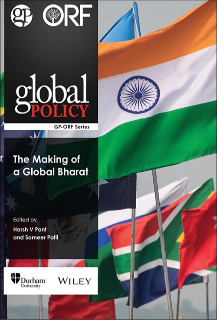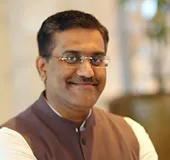Introduction
An ambitious and articulate Bharat is reimagining its global engagement at a time when cracks are appearing in the post-1945 world order. A host of challenges—such as the rise of multipolarity, the onset of deglobalisation, the advent of a technological revolution, the deepening polarisation between the East and the West, and the divide between the Global North and South—are upending the established order that was built on a foundation of hope and cooperation. Old ideas and institutions can no longer hold the weight of our problems, even as assumptions of the past need a radical rethink.
Amid this intense and transformative global change, India is redefining its foreign policy to navigate the complex geopolitical landscape. Indeed, in the past decade, Prime Minister Narendra Modi’s government has implemented a new and pragmatic foreign policy vision that recognises these changed global realities. A closer look at India’s global engagement during this period reveals several distinct defining traits of this vision. Firstly, in undertaking this engagement, New Delhi harnesses the ancient wisdom of the Vasudhaiva Kutumbakam (one earth, one family, one future) philosophy. It symbolises the interconnectedness of all living beings and promotes a sense of global unity and compassion. Inspired by this thought, India is anchoring itself as the voice of reason and dialogue, and rallying the international community to tackle challenges like climate change, pandemics, and economic inequality.
Secondly, India appreciates the significance of collaborative partnerships in achieving its foreign policy objectives. So, overcoming the hesitation of the past, New Delhi is now confidently embracing like-minded countries to secure trade deals, technological collaborations, and access to critical resources. For this, it has tapped into time-tested strategic partnerships and forged new ones through bilateral engagements and minilaterals.
Thirdly, this foreign policy vision appreciates that fulfilling India’s national interest need not be antithetical to achieving global good. If executed properly, it can lead to a win-win for India and the world and promote shared prosperity. Therefore, initiatives like the International Solar Alliance or digital public infrastructure are not mere buzzwords. Rather, they are blueprints for a future where sustainable progress, digital inclusion, and equitable solutions pave the way for a better world. They also position India as a pivotal player in delivering public goods to the world.
Fourthly, there is an acknowledgement of the shift in power dynamics, recognising the rise of multiple influential players beyond the traditional West. More importantly, this foreign policy vision elevates the Global South’s crucial voice in shaping the global agenda. The inclusion of the African Union in the G20 at the New Delhi Summit in September 2023 and advocacy of the idea of ‘reformed multilateralism’ at the United Nations (UN) are concrete expressions of this vision.
Finally, India now understands the critical role of geoeconomic heft in accomplishing the status of a ‘leading power’. As such, New Delhi has strategically woven economic diplomacy into the fabric of the country’s development goals, focusing on securing investments and generating employment. By actively pursuing new trade agreements and nurturing foreign investment inflows, India has brought about a transformative shift in its economic diplomacy.
A reimagined foreign policy, informed by this nuanced understanding, is paving the way for increased global influence, enhanced regional stability, and more sustainable development for India and the world. Through this ‘India Way’, New Delhi has deftly woven a tapestry of progress, not with the threads of geopolitical agendas, but with the vibrant colours of global cooperation and a focus on humankind’s needs.
This issue of the GP-ORF Series, titled The Making of a Global Bharat, celebrates India’s global engagements and explores the core elements of this new foreign policy vision shaped over the past 10 years. It includes curated essays by renowned scholars and domain experts who unpack the ideas and critical initiatives powering India’s global resurgence.
The first four essays examine India’s positioning in the shifting geopolitical landscape. Harsh V Pant and Yogesh Joshi decode India’s reconceptualisation of strategic autonomy that eschews any major power dominance and asserts its strategic independence. Amrita Narlikar then deep-dives into ancient strategic thought to reveal a Bharatiya vision of global order that deftly fits elements of realism to advance India’s and like-minded partners’ interests.
Velina Tchakarova’s essay examines India’s role in bridge-building within a deeply fragmented and polarised international landscape, highlighting the challenges and opportunities that lie ahead for India’s strategic positioning in global geopolitics. Finally, Leslie Vinjamuri assesses India’s G20 presidency, which successfully prioritised the developmental needs of the Global South amidst the geopolitical gridlock.
The next set of essays examines specific regions and challenges where India has crafted unique responses. Rahul Roy-Chaudhury focuses on the Indian subcontinent through the lens of the reconfigured ‘neighbourhood first’ policy and examines New Delhi’s efforts to achieve regional stability and cooperation. Max Abrahms and Kabir Taneja, meanwhile, look at the emerging contours of India’s policy in West Asia, a region that has witnessed a fundamental transformation in recent years. Satoru Nagao and Pratnashree Basu look at the role of the Quad—an important minilateral that brings together Australia, India, Japan, and the US—in shaping the new regional order in the Indo-Pacific and the factors driving India’s engagement with this important grouping. Next, Cleo Paskal looks at India’s handling of the delicate and multifaceted relationship with China while understanding the imperatives of the Modi government’s firm response to Beijing’s hostile behaviour.
India has also initiated some specific initiatives that seek to strengthen its international standing and global partnerships. Sinderpal Singh examines India’s evolving economic partnerships by looking at its response to the securitisation of economic interdependence, its recently signed comprehensive economic partnership agreements, and its attempt to serve as a bridge between the Global South and the developed world. S. Paul Kapur analyses India’s acquisition of significant defence capabilities by pursuing domestic defence industrialisation and security partnerships with like-minded countries. Sameer Patil then explores the idea of reformed multilateralism and India’s efforts to keep the UN-led multilateral framework relevant to contemporary international politics.
Elizabeth Sidiropoulos reviews India’s efforts to strengthen ties with the Global South and raise its concerns in international forums. Erin Watson looks at India’s thriving technology partnerships with like-minded partners and the broader benefits of these partnerships that enable the digital world and human development. The final essay by Justin Bassi narrates the Raisina Dialogue’s critical role as a platform for a ‘Global Bharat’ and as a forum to generate innovative solutions for contemporary challenges.
Through incisive insights, these essays explore key aspects of India’s new foreign policy in the context of an unpredictable international order.
We want to thank our editor, Preeti Lourdes John, for her impeccable editing and efforts in preparing the volume for publication under a tight deadline. We also want to thank ORF intern Abhishek Khajuria, who helped us with the formatting of citations.
Harsh V Pant and Sameer Patil
The views expressed above belong to the author(s). ORF research and analyses now available on Telegram! Click here to access our curated content — blogs, longforms and interviews.

 PDF Download
PDF Download



 PREV
PREV



